 Petzlover
Petzlover Both Bull Terrier Miniature and Greyhound are originated from United Kingdom. Bull Terrier Miniature may grow 43 cm / 16 inches shorter than Greyhound. Bull Terrier Miniature may weigh 25 kg / 55 pounds lesser than Greyhound. Both Bull Terrier Miniature and Greyhound has same life span. Bull Terrier Miniature may have less litter size than Greyhound. Both Bull Terrier Miniature and Greyhound requires Low Maintenance.
Both Bull Terrier Miniature and Greyhound are originated from United Kingdom. Bull Terrier Miniature may grow 43 cm / 16 inches shorter than Greyhound. Bull Terrier Miniature may weigh 25 kg / 55 pounds lesser than Greyhound. Both Bull Terrier Miniature and Greyhound has same life span. Bull Terrier Miniature may have less litter size than Greyhound. Both Bull Terrier Miniature and Greyhound requires Low Maintenance.
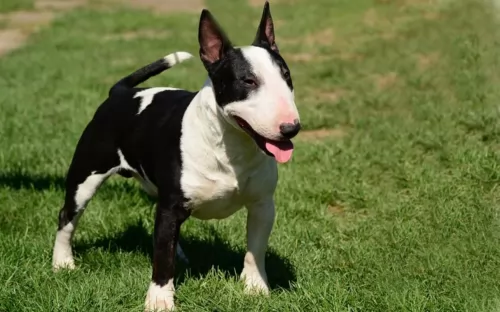 Less well known than the Bull Terrier, the Miniature Bull Terrier which actually follows the same breed standard, has a height of 35cm. The Bull Terrier and Miniature are classified as the same breed. The weight of the smaller Miniature is only about 15kg.
Less well known than the Bull Terrier, the Miniature Bull Terrier which actually follows the same breed standard, has a height of 35cm. The Bull Terrier and Miniature are classified as the same breed. The weight of the smaller Miniature is only about 15kg.
It was in the early 1800s that the Miniature Bull Terrier was developed, descending from the English Bulldog as well as the White English Terrier which is now extinct. This blend produced the Bull and Terrier, which was later shortened to the Bull Terrier. They came in a number of colors such as pure white, white and tan as well as white-and-black-patched or tri-colored.
Breed fanciers wanted a compact dog which looked much the same as the larger Bull Terrier. It was in 1938 that Colonel Glyn founded the Miniature Bull Terrier Club in England and the Miniature Bull Terrier Club of America was formed in 1966.
 The Greyhound belongs to a group of dogs known as sighthounds. This is an ancient sighthound breed dating back a few thousands years.
The Greyhound belongs to a group of dogs known as sighthounds. This is an ancient sighthound breed dating back a few thousands years.
The dog has been bred for racing but today is also a popular pet. They’ve also been used for hunting too because of their keen eyesight and sense of smell.
In the United States there are Greyhounds registered with the American Kennel Club as well as those registered with the National Greyhound Association.
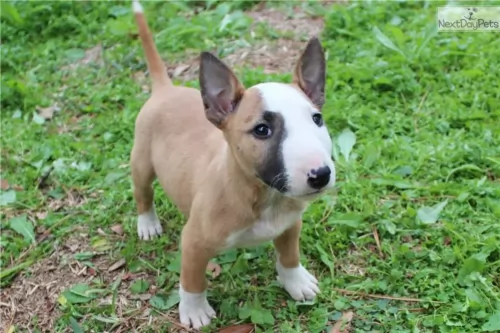 Miniature Bull Terriers, just like the regular Bull Terriers have short, glossy coats and these coats can be white, tan, brindle or tri-color such as black, tan and white. This is a muscular little dog, with the same very distinctive egg-shaped head and small, closely-set dark eyes and erect ears. The medium length tail is carried horizontally.
Miniature Bull Terriers, just like the regular Bull Terriers have short, glossy coats and these coats can be white, tan, brindle or tri-color such as black, tan and white. This is a muscular little dog, with the same very distinctive egg-shaped head and small, closely-set dark eyes and erect ears. The medium length tail is carried horizontally.
The Miniature Bull Terrier isn’t particularly good with small children, but he still makes a good companion for people, whether he lives in the city or the country. In fact, this smaller breed Bull Terrier makes a great pet for people with smaller spaces, and like the Bull Terrier, he is a loving, devoted pet. He has an entertaining personality, is playful and energetic, making him a good watch dog.
However, even though he is small, he is always more than ready to take on any larger pets and therefore isn’t considered the greatest pet to have if you have other animals in the house. However, with excellent training and socialization, this handicap can be overcome.
 The Greyhound is a tall, muscled, long-legged, slender dog with a flexible spine, a deep chest and exceptional eye sight.
The Greyhound is a tall, muscled, long-legged, slender dog with a flexible spine, a deep chest and exceptional eye sight.
The Males are usually about 71 to 76 cm in height with the females being slightly smaller. The dogs weigh in the region of 27 to 40 kg. The coat of the dog is short and smooth and is found in an assortment of colors, from fawn to white, tan, black and brindle.As far as grooming goes, he is looked upon as a low maintenance breed.
He has a long narrow muzzle, semi-erect/semi-floppy short ears and a long slender tail.
Sometimes referred to as being hypoallergenic, you need to allow your Greyhound indoors as the dog doesn't have an undercoat. He is therefore more susceptible to extreme temperatures. The face is long, narrow and pointed, the ears short and half-erect-half-floppy with a long, thin, whip-like tail.
Intelligent and gentle, the Greyhound is described by those who have owned them as wonderful pet. They are somewhat aloof around strangers but love their own human family. This is a non-aggressive, gentle, docile, calm dog. They are loving and get on well with their entire family, whether human beings or pets.
They’re sensitive dogs who appreciate quiet, calm environments. They may be quiet, but they are still social, loving the company of their family. They’re not great barkers and because they are non-aggressive, they don’t make wonderful guard dogs.
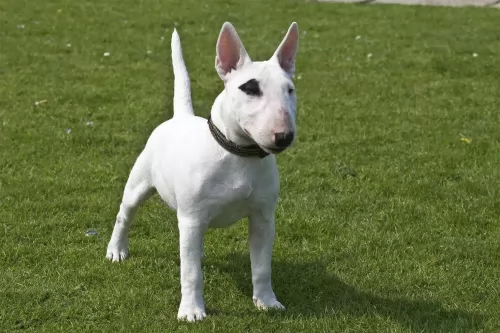 The attractive Miniature Bull Terrier is just a small version of the regular Bull Terrier, and many people are drawn to them because they have all the spunk of the larger breed but are easier to manage. He is such an entertaining little dog and guarantees to make an excellent family companion. He is just longing to be involved in every family activity happening around him.
The attractive Miniature Bull Terrier is just a small version of the regular Bull Terrier, and many people are drawn to them because they have all the spunk of the larger breed but are easier to manage. He is such an entertaining little dog and guarantees to make an excellent family companion. He is just longing to be involved in every family activity happening around him.
He becomes attached to his human family, but this deep bond between him and his family can lead to separation anxiety. Never leave him alone day after day in the backyard. You wouldn’t to that to one of your children, and he is a family member, albeit a 4-legged one.
Just like the standard Bull Terrier, the Miniature Bull Terrier is going to need firm training from a young age. Then he becomes an exceptional pet as he understand the boundaries in your particular home.
 The Greyhound, forgetting about the racing part, makes a superb pet too. He won't do well in a household where there are screaming, noisy children and adults as he wants a quiet home to live in.
The Greyhound, forgetting about the racing part, makes a superb pet too. He won't do well in a household where there are screaming, noisy children and adults as he wants a quiet home to live in.
He can get on well with kind, gentle, respectful children as well as with pets in the home. Just like any dog, he will also need training and socialization as this can build up his confidence and then he knows how to please his owners and what they expect.
The Greyhound will require a gentle, fair, kind owner who understands his need for peace and quiet, and then he becomes a most wonderful devoted, loyal and loving pet.
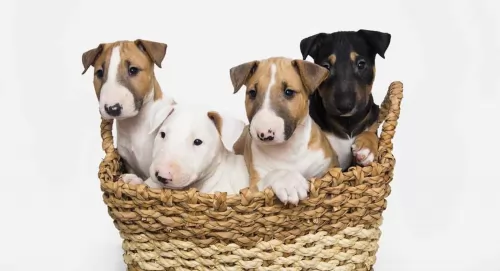 The Miniature Bull Terrier can live to be 10 to 12 years of age. Their most serious health issue is blindness which is caused by lens dislocation, showing up more or less after 3 years of age. With the white dogs, other breed health concerns can include congenital deafness and compulsive tail chasing.
The Miniature Bull Terrier can live to be 10 to 12 years of age. Their most serious health issue is blindness which is caused by lens dislocation, showing up more or less after 3 years of age. With the white dogs, other breed health concerns can include congenital deafness and compulsive tail chasing.
Some Bull Terriers develop a compulsive neurologic disorder where the dog turns round and round chasing his tail. As soon as you see this, try and distract him with an exciting game, because allowed to develop, it’s a habit that can become difficult to control.
This is a common problem with dogs and you need to watch that tartar build-up on the teeth which can lead to infection of the gums. Brush your pet’s teeth with special dog toothpaste and toothbrush 2 or 3 times a week so that he doesn’t lose any teeth. Bad teeth can affect other organs such as the kidneys and heart.
 Greyhounds are a wonderfully healthy dog breed and with good care can reach 14 years of age. They aren't prone to many genetic illnesses and unlike so many other dog breeds, this is one dog that doesn't battle with hip dysplasia – in fact it is almost unknown among this tall, slim dog breed.
Greyhounds are a wonderfully healthy dog breed and with good care can reach 14 years of age. They aren't prone to many genetic illnesses and unlike so many other dog breeds, this is one dog that doesn't battle with hip dysplasia – in fact it is almost unknown among this tall, slim dog breed.
The Greyhound does however, have a deep chest and this is what makes him vulnerable to bloat or gastric torsion. You have to take action quickly if you detect bloat – the stomach swells up – as this is a life-threatening condition that can occur quickly when air is trapped in the stomach. The stomach can become twisted.
Make sure your Greyhound doesn't gobble his food too quickly and preferably give him smaller meals as opposed to one or two large bowls of food.
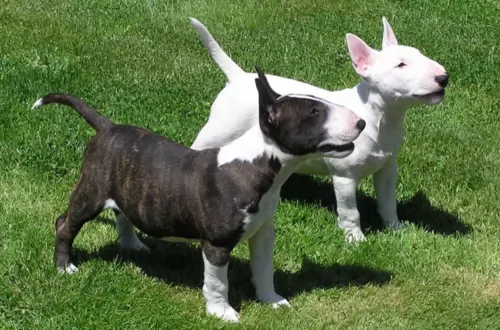 With his short, smooth coat, the Miniature Bull Terriers requires little grooming. He’ll need a good brush down twice a week to remove loose hairs.
With his short, smooth coat, the Miniature Bull Terriers requires little grooming. He’ll need a good brush down twice a week to remove loose hairs.
This is one of the best things you can do for your Bull Terrier if you don’t want them having puppies. Spaying or neutering decreases the likelihood of certain types of cancers too.
Keep your dog’s diet consistent, varying between a top quality commercial produced dog food appropriate to his age. You can include home-made meat, vegetables and rice and some raw meat every now and then. Never feed him human-food such as peanuts, crisps and chocolate. Always have fresh, cool water available night and day.
 Your Greyhound’s breeder will be the best guide for the type of- and the amount of dog food your hound will need. Of course, a growing puppy has different nutritional needs from a mature or senior Greyhound.
Your Greyhound’s breeder will be the best guide for the type of- and the amount of dog food your hound will need. Of course, a growing puppy has different nutritional needs from a mature or senior Greyhound.
Growing puppies and young dogs use a lot of energy so they will require a diet rich in protein. According to Greyhound experts, an adult Greyhound dog will need an average daily caloric intake of 1740 calories.
Older dogs and those that have been spayed or neutered will need less. Apart from the very best quality kibble, your Greyhound will most certainly require raw meat from time to time. You can also give him some cooked chicken, vegetables and brown rice. He should have access to a constant supply of fresh, cool water.
The Greyhound's coat is smooth and short and he sheds very little so he will only need a gentle brush-down once or twice a week.
Having a relaxed lifestyle is what your Greyhound will love. He is a dog that needs to spend time indoors. When outdoors, whether you live in the city or the country, he will need daily walks and a run in the park regularly.
Just because he is a sprinter, it isn't wise to take him with you with cycling or jogging as he is geared for a short burst of speed as opposed to a long run.